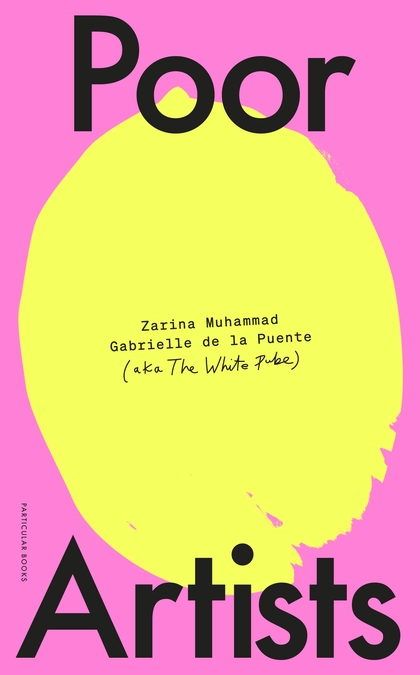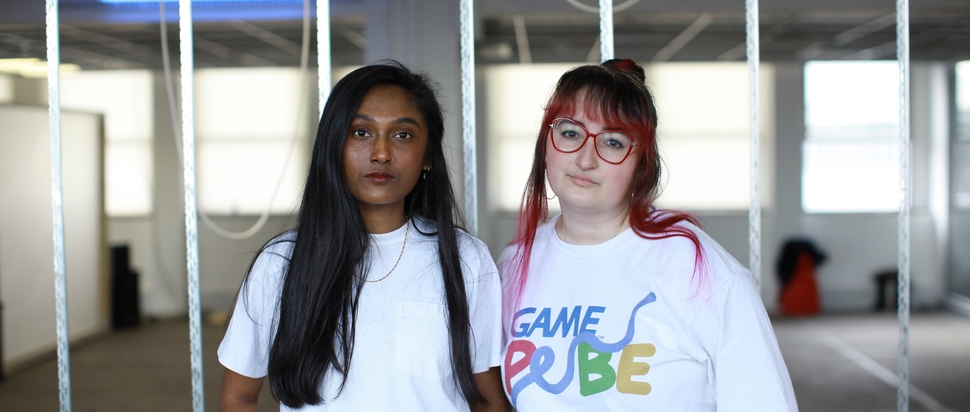The White Pube's Gabrielle de la Puente on new book Poor Artists
We chat with Gabrielle de la Puente, one half of infamous critical duo The White Pube, about their first book Poor Artists ahead of her appearance at Edinburgh's Radical Book Fair
Gabrielle de la Puente wants you to remember the posters on your teenage bedroom wall.
In Poor Artists, De la Puente and her “co-everything”, Zarina Muhammad – the duo behind the subversive critical platform The White Pube – long for a world where it’s normal to be obsessed with something after adolescence; to fixate and create for the sake of it. A world liveable for artists. A patchwork of myth, De la Puente and Muhammad’s experiences, and anonymised interviews with over 20 people – from Turner Prize winners to technicians – De la Puente tells me that the book is a bit of a “Frankenstein”. It follows the story of Quest Talukdar through her art school days to her professional debut. Fact and fiction blur, genres bend, and De la Puente says she wants readers to feel the flux of the journey.
“We didn't want to write a story,” she says. “We’re going to do gothic horror, and then we're going to do a comedy zombie chapter: mix things up to keep people on their toes, but also to make sure they know it’s more about the content than the form. The rest of it, the set dressing, is there to make people feel like everything is elastic and therefore, everything can change.”
Elasticity is central. In Poor Artists, Quest bends around the structures of the art world as its figures twist into unrecognisable shapes. Outside of the book, De la Puente and Muhammad’s creative process is constantly morphing. Quest didn’t even exist until four months into writing and the book kept evolving until the very end. “It was kind of fun to have an almost finished book and then do another interview and have all these new ideas,” she says. “To sprinkle confetti over the top of it is how it felt. Or like, salt. Lots of salt.”
While the pair set out to write a book of “whimsy” about being an artist, the interviews teased out a bleaker message they knew they had to explore. “We wrote this book during a time when we realised we don't have sick leave, and I am unable to work most days. We ended up interviewing people about that moment where you think, ‘I need to get a real job.’ Or do you not even need to ask that question, because you've got so much money in the bank?”

This compromise – between financial security and a creative life – is at the heart of Poor Artists. But so are the other tensions which follow any “non-artist” through intersecting systems of oppression. Why must I make more and more money? How do I express myself through my queer, racialised, disabled or marginalised body without having to tame it, or simplify it, or sell it? What if I lied on my CV? Poor Artists explores these answers through its bravest characters, and it’s not lost on De la Puente that they exist in a universe enabled by a publishing giant. But the pair realised that if they wrote a nonfiction book, they could get an advance and afford to be writers for a year. And as writers, they had plans for how their work would confront the institutional recognition they oppose.
“There’s a chapter which says that tyrants have an insatiable appetite, and could you insert something into them like a virus?” De la Puente says. “I hope this book is that little bit of poison. And, if not this book, then maybe someone else will create the artwork that will have the same effect on institutions. That’s how I squared it with myself.”
If Poor Artists is poison for institutions, it is a tonic for the people. It’s for art students at orientation and computer programmers who can still remember the painting in their grandmother’s bedroom. It’s for job-seekers who wish they could sleep under their old Buffy posters instead of in front of their laptop.
Where do we go, then, when we face blow after blow from the institutions that claim to support us? De la Puente advises us to think smaller. “I think the only thing we can do is to consider creative communities on the scale of who our neighbours are,” she says. “Who around us has a relationship with film, or books or theatre? How can we help each other get that off the ground?
“It’s important to reduce the scale of how we are working in order to protect ourselves. I think we need to feel the material again. It feels more beneficial, and more true to art to be having those conversations with someone two doors down, rather than a faceless funder who’s going to decide whether you get to be an artist that year or not.”
De la Puente says she doesn’t want to be on her deathbed thinking about an Arts Council England grant she didn’t get. Instead, like Quest, she wants to have lived a life making. So, maybe it's time to resurrect fan pages and homemade cards; to ask your friends what colour the water really is; to deconstruct the story and start telling the truth. Add a bit of myth, some perspective, until it’s difficult and pleasing – until it’s worth living for.
Poor Artists is out now with Particular Books. Gabrielle de la Puente will be at Edinburgh's Radical Book Fair, Assembly Roxy, 22 Nov, 12:30pm
